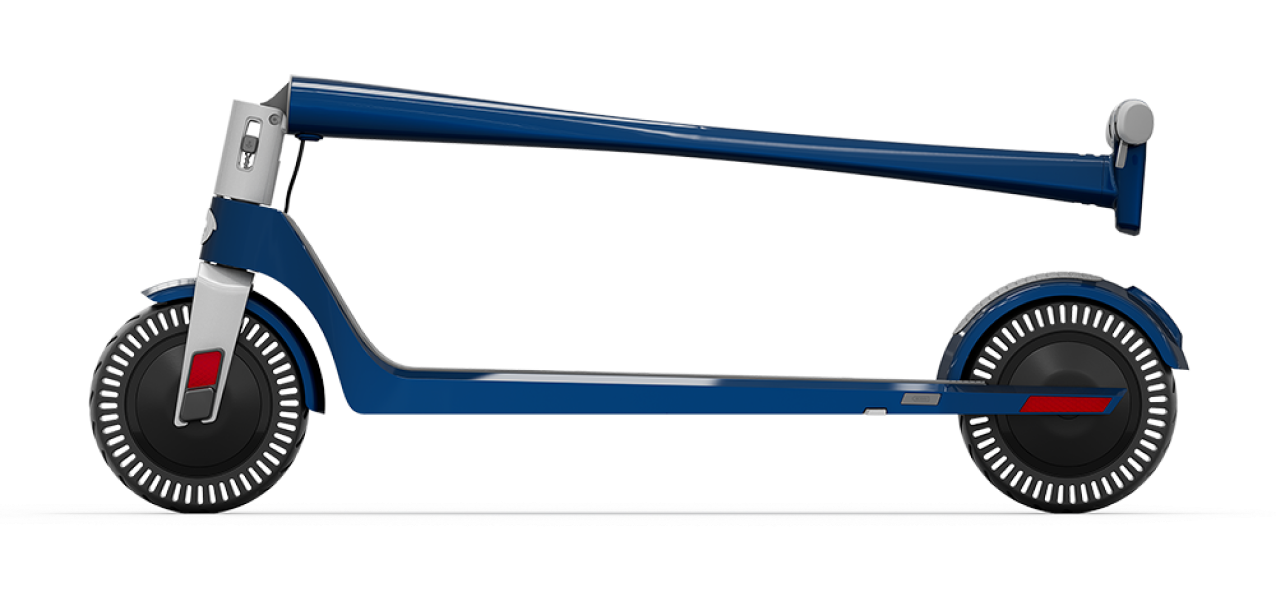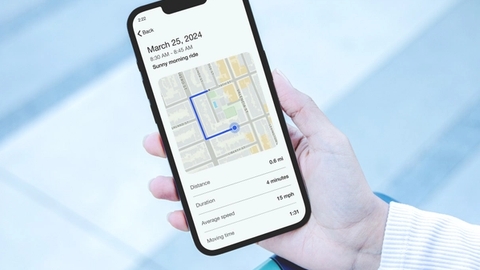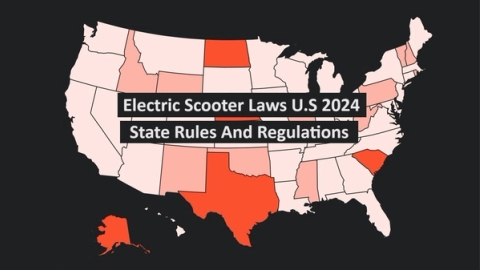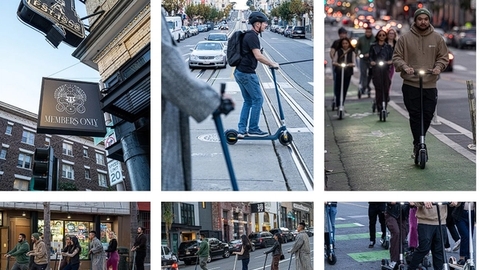With White Glove Love, we go where you go. All-Access members who are traveling can get an Unagi electric scooter for use during their trip, delivered to their hotel or Airbnb, at no extra charge. Now available in 8 U.S. cities.
“Is my electric scooter legal?”
The state of e scooter laws has changed rapidly over the past few years, and we have done our best to keep riders informed of the latest developments.
Unagi produced the first comprehensive guide to electric scooter laws in 2019. The resource proved so popular, it got major updates in 2021 and 2022, including a summary of national laws and a breakdown of laws by state and some major cities.
The 2022 guide – a collaboration between Unagi and Rider Guide (then Electric Scooter Guide) – represented a huge undertaking, a project whose scope showed the disorganized state of information about electric scooter laws.
One year later, the legal landscape for e-scooters hasn't changed much, except that information about scooter laws has become more available.
The Unagi guide to electric scooter laws might not be the definitive guide for long, as micromobility becomes integrated into urban landscapes nationwide. We welcome the competition and hope this information spreads far and wide!
Below, you’ll find our updated comprehensive guide to electric scooter laws for 2023-24.
Disclaimer: Unagi is not an official resource for legal advice. Always ride responsibly and wear a helmet.
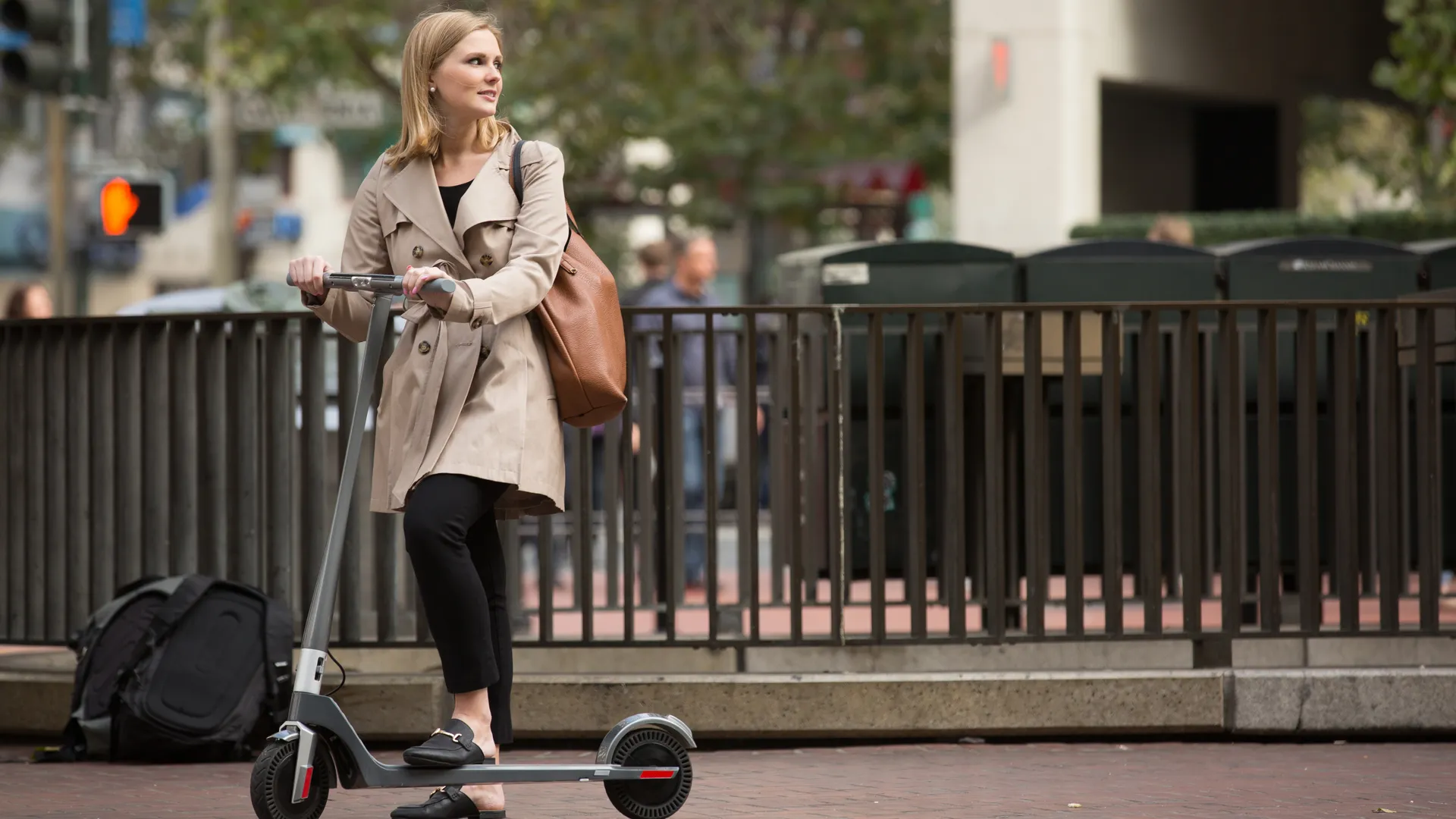
Navigating electric scooter laws in the USA
There are no national laws regarding electric scooters specifically, but scooters are covered under a national statute that limits two or three wheeled vehicles powered by an electric motor (or a motor and pedals) to speeds of under 20 mph and allows them on roads as long as they have a motor of 750 Watts or less.
The Federal statute applies to electric bicycles and e scooters broadly, but states and cities can make their own laws limiting, or even banning, scooters, as you've surely heard in the past few years.
Luckily, there have been more limits and legal definitions than bans. In fact, only one state to date, Pennsylvania, has banned e scooters completely.
To get a clear understanding of the licensing requirements, rules and regulations, and age restrictions imposed by authorities. Let's delve into each of these aspects:
License and registration requirements for electric scooters
In many states, operating an electric scooter does not require a driver's license. However, certain states may have specific provision. It is important to consult your state's Department of Motor Vehicles or relevant transportation authorities to determine the specific license requirements in your area.
Unfortunately, three states, North Carolina, Hawaii, and Louisiana, stipulate a DMV registration for privately owned electric scooters. These laws may not be statewide electric scooter regulations, so as always check with your local authorities to confirm before you ride an e scooter on public roads.

Rules and regulations for riding electric scooters on the roads
Riding a scooter on public roads means adhering to certain rules and regulations for your safety and the safety of others. Some common traffic laws include obeying signals, using designated bike lanes where available, and giving pedestrians the right of way.
Additionally, most states require electric scooter riders to wear helmets, just like bicyclists. It's important to familiarize yourself with the specific electric scooter regulations governing scooter use in your state to avoid potential fines.
Aside from the general rules and regulations, it is also important to be aware of any local ordinances or city-specific regulations that may exist.
Some cities have implemented additional rules to address the growing popularity of electric scooters. These rules may include a speed limit, parking restrictions, and designated scooter zones. We'll cover some of these specific scooter laws by state below.

Caption: electric scooters are allowed on most bike paths but check local laws where you are to make sure. They are usually not permitted on sidewalks. Riding on the sidewalk can be dangerous and should be avoided unless it's necessary to avoid high-speed traffic.
Sidewalk riding
In most cases, riding an electric scooter on the sidewalk is particularly dangerous for riders and pedestrians alike. Sidewalk riding has led to a high incidence of accidents and complaints about shared scooters. It should be considered unsafe in most circumstances.
Seventeen states ban riding on the sidewalk, but there are instances were sidewalk riding is actually the safer option, when there are few to no pedestrians and high speed traffic poses too many dangers on the road.
In cities built just for cars, sometimes the sidewalk is the only place to ride. Read more about electric scooters and sidewalks at this post.
City streets
In most places where scooters are allowed, they are allowed on streets with lower speed limits. Sometimes they are limited to 35 mph zones, sometimes to streets with a speed limit of 25 mph.
Few scooters exceed these speeds, in any case, and while there are high speed scooters on the market, they are limited on public roads.

Speed limits
Most shared electric scooters don't go fast enough to break any speed limits, but private e scooters do, and it's tempting, if you own one, to ride it as fast as you can. Yet most cities and states cap electric scooter speeds at 20 mph. Exceed the speed limit at the risk of a warning, ticket, or accident.
Helmet requirements
As we mentioned, most states require that e scooter riders wear helmets, or at least riders under a certain age. We recommend that all riders, regardless of age or geographical location, wear helmets (see an excellent helmet guide here).
The data is in: most scooter fatalities and severe injuries are head injuries that occur to riders who aren't wearing helmets. Wearing helmets and reducing speed are the best ways to avoid accident and serious injury.

Caption: Age restrictions ensure riders have the necessary maturity level to make good decisions when riding electric scooters, avoiding distractions and unsafe riding practices like two or more on a scooter.
Age restrictions for electric scooters in the US
Another critical aspect of electric scooter laws is the minimum age requirement for riders. While the age restrictions vary from state to state, many states set a minimum age of 16 to operate an electric scooter legally.
Some states may also require parental consent for riders under a certain age. Checking your state's specific age requirements will help ensure that you comply with the law and ride responsibly.
It's important to note that age restrictions not only apply to the operation of electric scooters but also to the purchase or rental of these vehicles.
Some states may prohibit individuals under a certain age from purchasing or renting electric scooters.
These restrictions aim to ensure that riders have the necessary maturity and understanding to safely operate these vehicles safely.
Electric Scooter Laws by State
Now that you have a general understanding of the license requirements, rules and regulations, and age restrictions for electric scooters in the USA, let's take a closer look at the electric scooter laws in each state for the year 2023.
Electric Scooter Laws in Alabama
In Alabama, electric scooters are classified as motor vehicles and are subject to the same rules and regulations as motorcycles. Riders must have a valid driver's license and must wear a helmet while operating an electric scooter. Additionally, electric scooters are not allowed on sidewalks and must be operated on the road, following all traffic laws.
Electric Scooter Laws in Alaska
In Alaska, electric scooters are considered personal mobility devices and are allowed on sidewalks and bike paths. However, riders must yield to pedestrians and give them the right of way. Electric scooters are also permitted on roads, but riders must follow all traffic laws and signals.
Additionally, Alaska requires electric scooter riders to wear a helmet if they are under the age of 18. This safety measure helps protect young riders and reduce the risk of head injuries.
Electric Scooter Laws in Arizona
In Arizona, electric scooters are classified as motorized scooters and are subject to specific regulations. Riders must have a valid driver's license or instruction permit to operate an electric scooter. Additionally, riders under the age of 18 must wear a helmet while riding.
Electric scooters in Arizona are not allowed on sidewalks and must be operated on the road, following all traffic laws. However, electric scooters are permitted on bike lanes and paths, as long as riders yield to pedestrians and follow any posted signs or regulations.
Electric Scooter Laws in Arkansas
In Arkansas, electric scooters are considered motor vehicles and are subject to the same rules and regulations as motorcycles. This means that riders must have a valid driver's license and must wear a helmet while operating an electric scooter.
Electric scooters in Arkansas are not allowed on sidewalks and must be operated on the road, following all traffic laws. Additionally, electric scooter riders are required to have liability insurance coverage, similar to what is required for motorcycles. This insurance coverage helps protect both the rider and other parties in the event of an accident.
Electric Scooter Laws in California
California, being one of the early adopters of electric scooters, has comprehensive regulations in place for their use. In California, electric scooters are classified as motorized scooters and are subject to specific laws and regulations. Riders must have a valid driver's license or instruction permit to ride electric scooters.
Electric scooters in California are not allowed on sidewalks and must be operated on the road, following all traffic laws. Additionally, electric scooter riders are required to wear a helmet, regardless of their age. It is also important to note that electric scooters are not allowed on roads with a speed limit greater than 25 miles per hour.
Electric Scooter Laws in Colorado
Riders in Colorado must have a valid driver's license or instruction permit to ride an electric scooter.
Electric scooters in Colorado are allowed on sidewalks and bike paths, but riders must yield to pedestrians and give them the right of way. When operating on the road, electric scooter riders must follow all traffic laws and signals. Additionally, electric scooter riders are required to wear a helmet if they are under the age of 18.
Electric Scooter Laws in Connecticut
Connecticut enforces specific laws pertaining to electric scooter use. In Connecticut, electric scooters are classified as motor vehicles and are subject to the same rules and regulations as motorcycles. This means that riders must have a valid driver's license and must wear a helmet while operating an electric scooter.
Electric scooters in Connecticut are not allowed on sidewalks and must be operated on the road, following all traffic laws. Additionally, electric scooter riders are required to have liability insurance coverage, similar to what is required for motorcycles. This insurance coverage helps protect both the rider and other parties in the event of an accident.
Electric Scooter Laws in Delaware
Electric scooters are classified as motor vehicles in Delaware and are subject to the same rules and regulations as motorcycles. This means that riders must have a valid driver's license and must wear a helmet while operating an electric scooter.
Electric scooters in Delaware are not allowed on sidewalks and must be operated on the road, following all traffic laws. Additionally, electric scooter riders are required to have liability insurance coverage, similar to what is required for motorcycles.
Electric Scooter Laws in Florida
In Florida, electric scooters are classified as motorized scooters and are subject to specific regulations. Riders must have a valid driver's license or instruction permit to operate an electric scooter.
Electric scooters in Florida are not allowed on sidewalks and must be operated on the road, following all traffic laws. Additionally, electric scooter riders are required to wear a helmet if they are under the age of 16.
Electric Scooter Laws in Georgia
In Georgia, electric scooters are classified as motorized scooters and are subject to specific laws and regulations. Riders must have a valid driver's license or instruction permit to operate an electric scooter.
Electric scooters in Georgia are not allowed on sidewalks and must be operated on the road, following all traffic laws. Additionally, electric scooter riders are required to wear a helmet if they are under the age of 16.
Understanding electric scooter laws is essential to ensure a safe and enjoyable riding experience. By familiarizing yourself with the license requirements, rules and regulations, and age restrictions in your state, you can confidently navigate through 2023 while adhering to the law. Remember, electric scooters can offer a convenient and eco-friendly mode of transportation, but it's crucial to ride responsibly and respect the regulations in place.
Hawaii
In Hawaii, riders must be over the age of 15 and wear a helmet under the age of 16. Scooters must be equipped with lights for use at night, weigh less than 75 pounds, and not exceed speeds of 15 mph.
Idaho
In Boise, electric scooters are allowed on streets, sidewalks, and the Greenbelt. Despite these rules, the state of Idaho does not have legislation specifically concerning the use of electric scooters.
State law classifies e-scooters along with various “motorized toys” and prohibits them from public sidewalks and roadways except where local law enforcement allows.
Illinois
In Illinois, e scooter riders under the age of 17 must have a valid driver's license, and scooters must have front and rear lights to ride at night.
Indiana
In Indiana, electric scooters must weigh less than 100 pounds and have a maximum speed of no more than 20 mph. Such scooters are treated as bicycles. You can ride them in the street and on bike paths, and you don't need insurance or a license.
Iowa
In Iowa, e scooters are allowed on roads with a speed limit of 35 miles per hour or less, bikeways, and sidewalks. They can be parked anywhere that bikes are parked, as long as they are not impeding the pedestrian right of way.
Since scooters share many regulations applied to bicycles, there is no requirement for license or insurance. E-scooters must have a white front light and a rear red light. A red rear reflector can be used in place of rear red light.
Kansas
Kansas has legalized electric scooters at the state level on roadways. Riders may not operate bikes or electric scooters on sidewalks or highways. Helmets are not required. Only riders with valid driver’s licenses may operate electric scooters, and scooters must be equipped with front and rear lights at night.
Kentucky
Electric scooters are treated like bicycles in Kentucky. This means you are not required to register them with the state, purchase insurance, or hold a driver’s license.
E-scooters may be operated by a person 16 years of age and older. By law, an e-scooter must be equipped with a front white light and a rear red light to maximize visibility.
Louisiana
Louisiana allows low speed electric scooters to operate on sidewalks, bicycle paths and streets with posted speed limits of 25 mph or less.
Helmets must be worn by those under the age of 17.
Maine
Electric scooters are legal in Maine at the state level. A drivers license is required to operate one.
Electric scooters are not permitted to be operated faster than 20 mph. When riding at night, a scooter must be equipped with a front white light and a red or amber rear light, as well as reflectors. Wheels must not exceed 10" in diameter and maximum power is capped at 750 watts.
Maryland
A low speed electric scooter is considered to be a bicycle for the purposes of the Maryland Vehicle Law. Scooters must have a maximum speed of no more than 20 mph.
Massachusetts
Electric scooters are legal in Massachusetts at the state level. In absence of other regulation, they are grouped with motorized scooters (i.e. mopeds). This requires electric scooter riders to wear a helmet, yield to pedestrians, and provide an audible signal when passing. A driver's license is required, and they are allowed a max speed of 20 mph.
Michigan
In Michigan, electric scooters cannot have a motor power greater than 2,500W (electric scooters are typically 500W-1000W) or a max speed greater than 25 mph.
Scooters are only allowed on streets with speed limits of 25 mph. Scooters may not pass other vehicles between lanes of traffic, and they require a white front light visible from 500 feet away and a rear reflector visible from 600 feet away.
Minnesota
Electric scooters are legal in Minnesota and are categorized as "motorized foot scooters," on which riders can stand or sit. Scooters should have a max speed of no more than 15 mph. Riders must be at least 12 years old, and helmets are required for those under the age of 18.
Riding on sidewalks is not allowed. An electric scooter must be equipped with a headlight and tail light for visibility in low-light conditions. Scooters are allowed on bike paths and trails that are not reserved for the exclusive use of non-motorized traffic, but local authorities can enact specific regulations.
Mississippi
Mississippi has no statewide laws regarding electric scooters, so jurisdiction goes to the cities and local municipalities.
Missouri
Electric scooters are legal in Missouri and are regulated as "motorized bicycles." They can be operated in the street or in bike lanes where available.
A driver's license is required, and if a scooter is to go above 30 mph, it will be regulated as a motorcycle.
Montana
Electric scooters are legal in Montana and regulated as "motorized bicycles." Adult electric scooter riders are not allowed to ride on the sidewalk.
Pedestrians always have the right away. Electric scooter riders must give a verbal warning if they are going to pass, and must always obey the traffic signals.
Nebraska
Nebraska has not enacted electric scooter regulation at the state-level, and the Nebraska DMV expressly states that scooters do not need to be registered.
When operating electric scooters on streets, riders must abide by the rules of the road. Riding on the sidewalk is prohibited.
Nevada
Electric scooters are legal in Nevada. Scooters must not weigh more than 100 pounds without a rider and must not exceed a max speed of 20 miles per hour. Riders must be at least 16 years old.
New Hampshire
New Hampshire does not have state-wide laws for electric scooters.
Some individual cities have passed their own regulation such as Portsmouth and Nashua, but these specifically concern the use and operation of shared fleet scooters like Bird or Spin.
New Jersey
New Jersey legalized electric kick scooters, categorizing them as “low speed electric scooters." They must not exceed a max speed of 19 miles per hour. Scooters are bound by the same rules of the road as bicycles.
A driver’s license is not needed to ride a scooter, and neither is insurance nor vehicle registration.
New Mexico
New Mexico does not have any statewide laws regarding electric scooters and has largely left it to cities and local municipalities.
New York
The state of New York legalized scooters in 2020, a monumental step for micromobility and the future of cities. Roughly 50% of car trips in the U.S. are under 3 miles, and in New York, trips are especially short.
At the state level, riders must be at least 16 years old, wear helmets if under the age of 18, stay off sidewalks, and stay off streets with speed limits higher than 30 mph.
Cities and municipalities have the right to either override these laws or extend them.
In NYC, scooters are not to exceed 20 miles per hour and must stay on streets with speed limits of 25 mph or less. Helmets are required for riders under 16.
North Carolina
Electric scooters are motorized vehicles under North Carolina Law, meaning they must be registered with the DMV and riders should have a valid driver’s license.
Scooters can only be ridden on streets that have a speed limit of 25 mph or less.
North Dakota
There are no laws in North Dakota specifically regulating electric scooters, but they are bound by the existing legislation for “motorized scooters” (i.e. mopeds).
Electric scooter riders are required to stay off sidewalks and bike paths. Electric scooters must have brakes, a headlight, and taillight. Riders must wear a helmet if under the age of 18.
Ohio
Ohio regulates electric scooters as "low-speed micromobility devices." Scooters must not exceed 20 mph or 100 lbs in weight. They are exempt from licensing and registration requirements.
E scooters are permitted on public roads but must yield to pedestrians and have front and rear lights at night. The minimum rider age is 16.
Oklahoma
There are no statewide laws in Oklahoma regarding electric scooters, so regulation has been left to individual cities.
Oregon
In Oregon, electric scooters are currently regulated as mopeds. Portland, the largest city in Oregon, does not permit scooters on sidewalks and requires that riders be at least 16 years old and not exceed 15 miles per hour.
Statewide, scooters can have motors with no more than 1000 watts, must have lights at night for visibility, and can go no faster than 25 mph.
Pennsylvania
In Pennsylvania, electric scooters are classified with bicycles and subject to the same rules and regulations.
Rhode Island
Rhode Island does not have statewide legislation addressing electric scooters. The city of Providence requires a valid driver's license or municipal ID. Scooters can be ridden on sidewalks or streets, and riders are encouraged to go slow and wear a helmet. On the street, riders are required to follow all rules of the road and obey traffic regulations.
South Carolina
South Carolina has no statewide laws pertaining to electric scooters, but it does allow cities to self-regulate scooter sharing programs.
South Dakota
Scooters are legal at the state level in South Dakota. An e-scooter is defined as having handlebars and either a platform to stand on or a seat. E-scooters are distinct from electric bicycles.
Electric scooters are permitted on sidewalks in South Dakota and can go no faster than 15 mph on any public road.
Tennessee
Tennessee defines an electric scooter as “a device weighing less than 100 pounds, with handlebars and an electric motor ... whose maximum speed is 20 miles per hour.”
E scooters must have brakes and front lights and rear lights or reflectors. Scooters cannot be ridden on sidewalks unless a city or local municipality allows it.
Texas
In Texas, there are no electric scooter specific laws, and thus they are bound by existing DMV rules for "motor-assisted scooters” (i.e. mopeds).
The law does not permit scooters to be ridden on roads with a speed limit greater than 35 mph and limits power to 750W. Electric scooters are exempt from safety inspection, license, registration and insurance requirements.
Utah
In Utah, e scooters are exempt from motor vehicle requirements like licensing and registration. Scooters must be equipped with a white front light and rear read light or reflector. They can be ridden anywhere that bikes can, which means roads with a speed limit of 25 mph or less.
Riders must not exceed 15 mph. Anyone under 15 years old must be under the direct supervision of a parent or guardian.
Vermont
Vermont has no statewide electric scooter laws, but has some regulation in place on the city level more focused on shared scooters (for example a 15 mph limit in Burlington).
Electric scooters are not permitted on sidewalks.
Virginia
Virginia's legislation states that scooters must weigh less than 100 pounds and have a top speed of no more than 20 mph. It sets a minimum age of 14 and blocks use on highways.
The law also permits counties and cities to regulate or ban micromobility vehicles via local ordinances.
Washington
The state of Washington sets a maximum speed of 15 miles per hour in either roadways or bike lanes. Reflectors are required at night. Those under 16 may not ride unless a local jurisdiction expressly allows it, and sidewalk-riding will also be determined on a city-by-city basis.
The state code also alludes to slower speed standards potentially being set for sidewalk riding in the future.
Electric Scooter Laws in Washington D.C.
In Washington D.C., electric scooters are classified as personal mobility devices and are allowed on sidewalks and bike lanes. However, riders must yield to pedestrians and give them the right of way.
Electric scooters in Washington D.C. are also allowed on roads, but riders must follow all traffic laws and signals. Additionally, electric scooter riders are required to wear a helmet if they are under the age of 16.
West Virginia
West Virginia does not have any laws regarding electric scooters, but they did pass a bill in 2020 to regulate e-bikes. It is safe to assume that these regulations may extend to scooters in the near future. This new law exempted e-bikes from license, registration, and insurance requirements. It also states that e-bikes must follow the same rules of the road as bicycles, and states that riders under 15 must wear helmets.
Wisconsin
In Wisconsin, scooters must not exceed a speed of 20 mph or a weight of 100 lbs. Scooters are not allowed on sidewalks except in certain circumstances, and riders are bound to the same rules of the road as bikes.
Wyoming
Wyoming has no specific electric scooter laws, but the state did pass a law that grants e-bikes the same privileges as traditional bicycles and defines a few different types of lightweight personal vehicles similar to e scooters with the same privileges.
*Disclaimer: Unagi, INC. has used best efforts, but does not in any manner guarantee the accuracy of the included findings regarding electric scooter laws in the United States or internationally. Electric scooter riders or those considering to purchase or begin riding electric scooters should refer to their local governments to obtain the most up-to-date information on the applicable, local legal standing of scooters.

Read more.

Read more.

Read more.

Read more.

Read more.

Read more.

Read more.

Read more.

Read more.
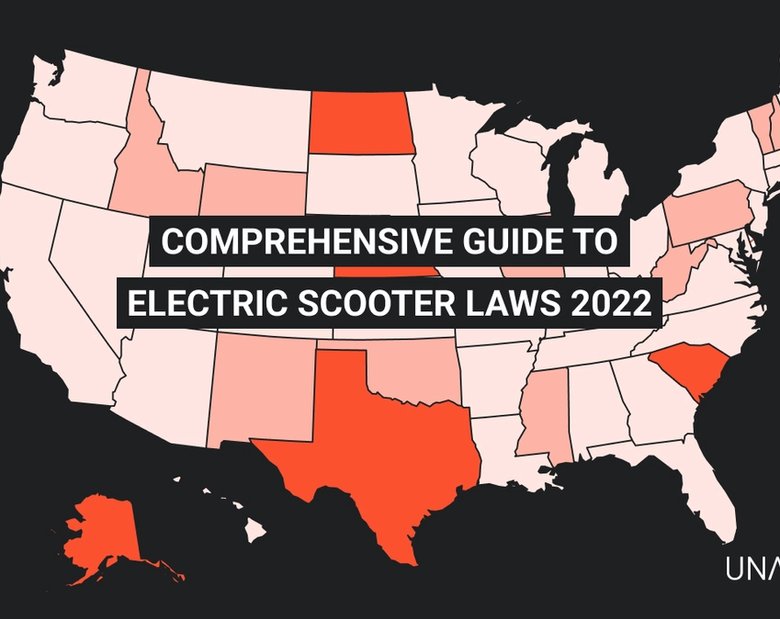
“Is my scooter legal?” is a question many are increasingly asking. The micromobility industry is one of the fastest-growing and most exciting in the world—with promises for...in addition to abundances of the basics of time and money savings. And with this pace of innovation comes a struggle for regulation to keep up.
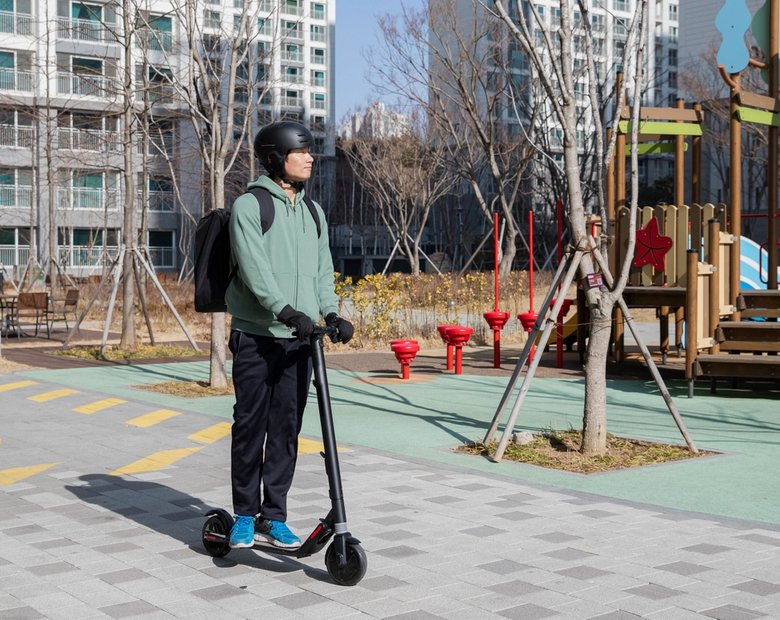
So, you're thinking about joining the electric scooter revolution, huh? You've seen those sleek and stylish scooters zipping around town, effortlessly gliding through traffic, and you can't help but wonder: Are electric scooters easy to ride?

In this guide, we'll break down what defines a lightweight electric scooter, why you should choose one, and the top features you should look for.
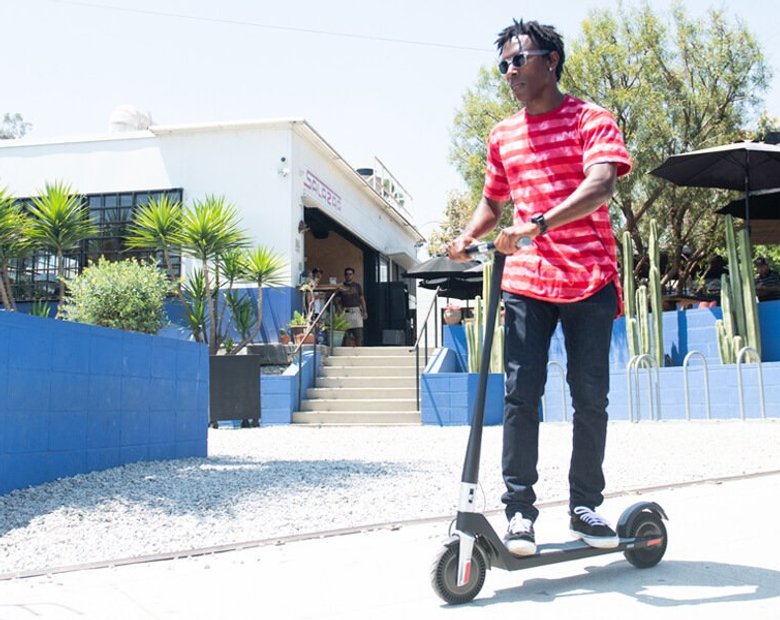
Want to get the most out of your electric scooter battery and extend your riding adventures? We've got you covered with our comprehensive guide full of maintenance tips and best practices.

*Disclaimer: Unagi, INC. has used best efforts, but does not in any manner guarantee the accuracy of the below findings regarding electric scooter laws in the United States or internationally. Electric scooter riders or those considering to purchase or begin…

It’s beyond question that we must drastically reduce carbon emissions in the coming years to head off the worst effects of climate change. How we do that has been a matter of considerably drawn-out debate. As individuals, it can be…

If you're considering riding an electric scooter for the daily urban commute - or even just for recreation - this article will give you the lowdown on getting insurance for an electric scooter.
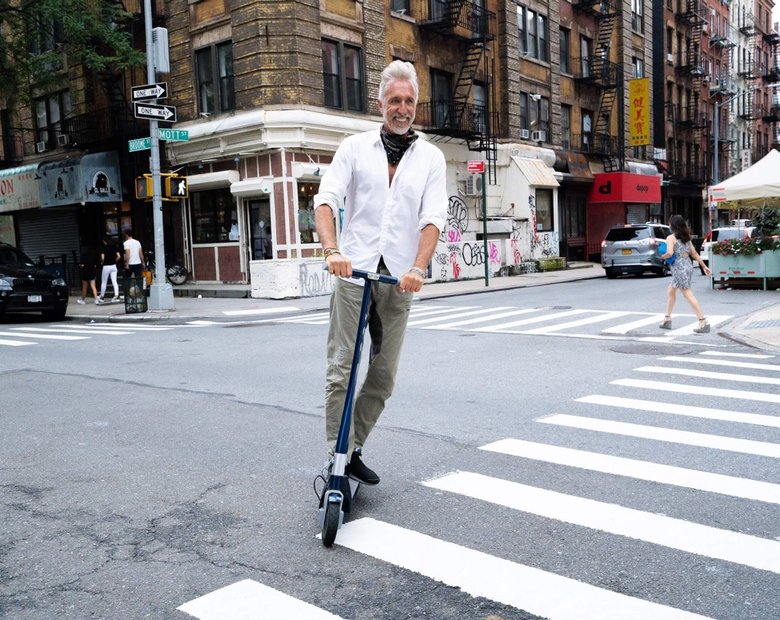
In many regions, there's a clear restriction against riding electric scooters on the road, with the rules steering their use towards designated areas such as bicycle lanes, multi-use paths, and shared street paths.
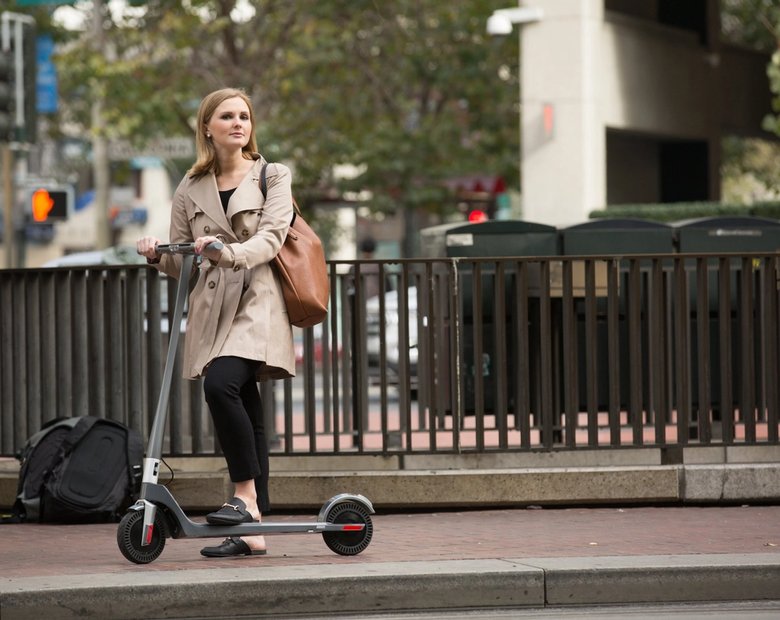
You’ve seen them all over your city’s streets, and everyone who rides one looks absolutely thrilled. So, why haven’t you picked up your own folding electric scooter yet? Maybe you’re worried about whether e-scooters require a driver’s license, or a…

The basis and the premise of my work is that we either operate out of love or we operate out of fear...Time is currency. The coolest thing about the scooters is that it's really quick, and it goes uphill. From there, traveling more efficiently and having a good time doing it--I think that's the most important thing.

Cynthia Leu has a full plate. A tech worker by day, Cynthia spends her off time balancing the parallel lives of a powerlifter, entrepreneur, mental health advocate, and more. Riding Unagi helps this USMC veteran cut down on everyday…

https://www.youtube.com/watch?v=7m2hVBE62LY Rasheed Muhammad is sick of Los Angeles traffic. In order to preserve his sanity, Rasheed has traded his everyday driving habit for the portable and beautiful Unagi Model One. It’s an essential accessory for navigating LA streets -- and…

Rich Lee, Co-Founder of San Francisco’s SPRO Coffee Lab, wants to share his love for coffee with the world. He depends on riding Unagi to avoid the hassle of navigating the parking crunch in the booming Mission Bay neighborhood.…


